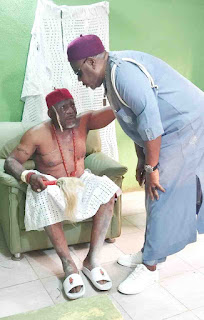Ichi Eze: Henry Ajudua, Accepting the Ibusa's Highest Status in Name and Cultural Essence
- Emeka Esogbue
In recent times, Obiship in Ibusa community nay Asaba and Okpanam have been facing the risk of extinction from these Enuani societies but the Ibusa people have a reason to thank the likes of Chief Dr. Henry Ajudua.
Multiple Obi systems were once the pride of the people of Asaba, Ibusa and Okpanam until interest in the title started to diminish. The distinct traditional system known as Enuani civilization—a socio-cultural development system that previously supported the people's society—became less appealing for a number of reasons, some of which are listed in the book "A History of Ibusa," written by Esogbue, E. (this author).
In these three Enuani settlements, Obiship was considered to have a high level of social standard and also commonly subjectively used by Enuani people to exclusively refer to their society and elitist Obis as high in nobility while implying others in status as civilized.
In Asaba, Ibusa, and Okpanam, the Obiship, also known as the Ezeship with interchangeability, was a strong institution whose holders could also have an impact on social issues.
Nowhere were the Ezes as powerful as they remained in the Asaba community. It was the enormous power held by the Asaba Ezes that led to the evolution of the Asagbaship around 1780, a stool first enjoyed by Obi Nenmo of Umuagu.
The Asagba of Asaba emerged when the entire affluent and noble Asaba Ezes were reborn under the Asagba monarchical canopy.
It is impossible to ignore how the British government lessened the Obis's authority and sway over these three communities. Eventually, the appeal of becoming an Obi faded, and the population began to decline sharply.
The colonialists' introduction of the Warrant Chief, who was as foreign to the people as he was in other cultures, also had the effect of overpowering the Obis's established social dominance. In practice and traditional essence, an Obi could be summoned, detained and even jailed on frivolous act and weight.
The wealth and rigorous process also involved in the initiation beginning with Mgbankpisi down to Alor, demonstrates Obiship as a title of the wealthy in the three Enuani society thus scary to even the willing individuals.
Thankfully, there is a fresh energy and excitement, particularly from Ibusa like Chief Dr. Henry Ajudua, who will proudly take on the Obiship with the official title of "Obi" after the current initiation is finished.
It is accurate to say that in the three societies that have been listed here, according to their cultural and ancestral hierarchy, "Obi" is the highest title in their social strata, and "Omu" is the highest title that any female must answer to.
"Obi" and "Omu" rank higher than all other titles in the people's core traditional beliefs, which existed prior to the advent of the Europeans. Therefore, in the core of traditional classification, any other title is superfluous.
The Ibusa people, who are enthusiasts of their forefathers' tradition, will be happy to welcome Chief Dr. Henry Ajudua of the Ajudua Ibusa lineage as Obi after initiation is complete and all required ceremonies have been completed.

Comments
Post a Comment